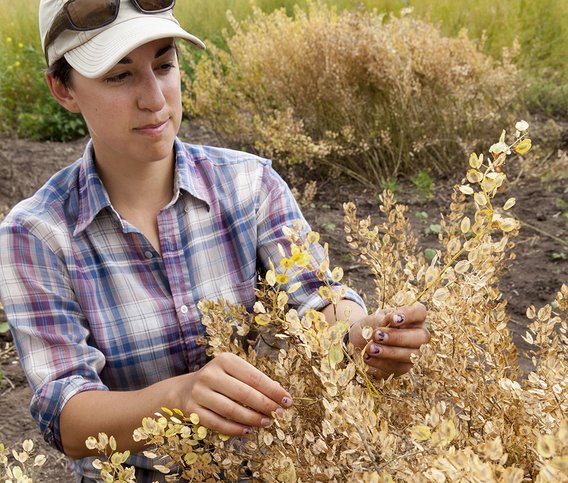
Feb. 5, 2024:
Cargill has awarded $2.5 million to the Forever Green Initiative at the University of Minnesota to support research into two novel oilseed crops—winter camelina and domesticated winter pennycress—that can produce seed-based oil for low-carbon transportation fuels while also protecting soil, improving water quality, and providing new revenue streams for farmers.
“Winter camelina and pennycress could be truly transformative for farmers, the environment, rural communities, and the economy of Minnesota and the Upper Midwest,” said Mitch Hunter, associate director of the Forever Green Initiative, a research platform in the College of Food, Agricultural and Natural Resource Sciences. “We are extremely excited to have this support from Cargill, which will greatly advance our research and help make these crops a reality for farmers.”
Winter camelina and pennycress could be a major climate solution for hard-to-electrify parts of the transportation sector because their seed oil can be refined into drop-in replacements for jet fuel and diesel. Grown in the off-season and with few inputs, the crops produce seed-based oil with a small greenhouse gas footprint.
“Cargill is committed to building a more sustainable food and agriculture system, and part of our approach is helping make regenerative agriculture practices commonplace,” said Lyle DePauw, crop innovation director for Cargill. “Winter camelina and domesticated pennycress have the potential to address key sustainability challenges in agricultural supply chains, including water quality concerns and demand for low-carbon fuel feedstocks. Cargill is committed to creating opportunities for farmers to be profitable and sustainable.”
Read the full press release via CFANS.
You can also find media coverage of the grant announcement:
- U of M research helps turn crops into jet fuel and diesel (KSTP)
- Cargill grant supports U of M effort to develop low-carbon crops for fuels and feed (KFGO)
- Cargill Gives U of M $2.5M to Study New Oilseed Crops (Twin Cities Business)
- Cargill Grant Supports University of Minnesota's Forever Green Initiative (Morning Ag Clips)